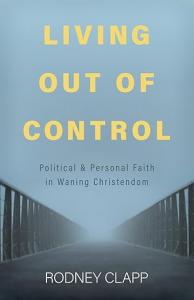Here I continue discussing Rodney Clapp’s excellent book Living Out of Control: Political and Personal Faith in Waning Christendom. Here I take up Chapter Seven: The Political Centrality of the Gospel. If you have read this chapter, feel free to discuss it. If you have not, feel free to ask a question.
I think the chapter title could be misunderstood. It’s not saying that politics is central to the gospel but that the gospel is central to politics—for the Christian. It is saying, though, that the full gospel always includes a political dimension and that dimension is what liberation theologians have called “the preferential option for the poor.” Rodney affirms that the church ought always to show practical concern for the poor. That is not optional.
I’m always delighted when an author gives us readers a nutshell summary of the whole book’s point. Here it is, on page 100: “God wants not abject, forced servility with God’s creation, but instead loving relationship. God wants us not simply to acknowledge the kingdom but to enjoy it. So now, on this side of the eschaton, the gospel and its entailments remain contestable. They can be debated, ignored, even refused. And that is God’s will. We as followers of Jesus are congruent lay called not to force or impose the gospel on others. We are not to manipulate, con, or intimidate them. Our witness instead is to live out of control and to enjoy the kingdom come and coming—so vividly, truthfully, excitingly, and delightfully that others might wish to join us.”
So what is the political mission of the church? First, according to Rodney, it is to proclaim the kingdom of God—not as instantiated in any state, nation, country or government but as God’s invasion of the world from its future, setting out a new order of life not based on domination or control but joy and peace, love and justice. Second, according to Rodney, it is to challenge the present order of things, an order based on those with power dominating the powerless. Finally, according to Rodney, it is to read out and in to the poor, whether spiritually or physically or both, and give them practical help.
In this chapter, as in others, I hear echoes of other books I have read. Earlier here I led a discussion of the book The Upside Down Kingdom. Rodney has clearly read and been influenced by it. Also, he must have read and been influenced by Resident Aliens (Stanley Hauerwas).
Too many contemporary American Christians are giving Christianity a very bad name by talking and acting like Social Darwinists and crass, jingoistic, chauvinistic nationalists. Hating immigrants has become synonymous, in the popular mind, anyway, with being Christian. “Christianity” is being redefined as a desire to control others and make them behave and be just like us.
Now, having said that, and knowing this will stir up controversy, I must say that I agree with the recent SCOTUS decision giving parents the right to opt their children out of class sessions in which LGBTQ books are being read, at least in elementary school. Not because there’s something wrong with LGBTQ people or literature! But because sexual orientation and practice should not be imposed on children. Christian parents and others have a right to protect their little children from being exposed to sexuality too early. Childhood needs to be protected. Yes, yes, I know. You don’t need to say it. “It’s about living in the real world.” But the “real world” is being changed inappropriately partly by educators who confuse education with social engineering.
There. There’s my rant. Take it or leave it. I don’t care. And I won’t post responses to it.
Back to Living Out of Control. I do not think Christians should try to control anyone except other Christians who claim to be faithful to their churches’ teachings but are not. I believe in church discipline. But Jesus never called his followers to control those who are not his followers. Speak to them prophetically, yes, but not criminalize their beliefs or behaviors just because they do not accord with ours.
However, and I have said it here before, as an American citizen I believe it is appropriate for me and for you to participate in the rough and tumble of American political life, not AS Christians but AS citizens. And as citizens, we have a right to bring our faith into the “marketplace of ideas” and set our worldview alongside others and ask people to consider it—especially our values—as better for everyone than alternatives. But we have to do so in a non-coercive way, by persuasive rhetoric appealing to facts and common sense and reason.
*Note: If you choose to comment, make sure your comment is relatively brief (no more than 100 words), on topic, addressed to me, civil and respectful (not hostile or argumentative), and devoid of pictures or links. If you have read this chapter, you may discuss it with me. If you have not, you may ask a question.*













